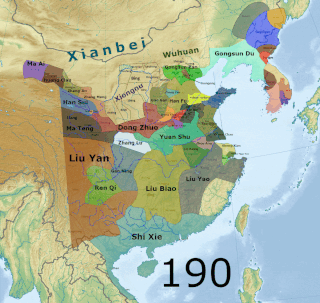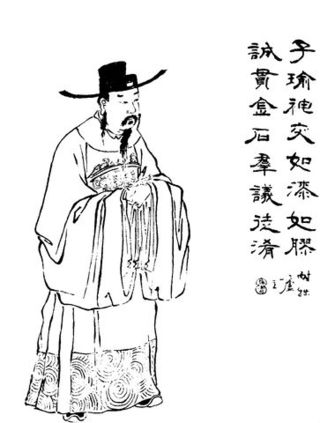
The Three Kingdoms of Cao Wei, Shu Han, and Eastern Wu dominated China from 220 to 280 AD following the end of the Han dynasty. This period was preceded by the Eastern Han dynasty and followed by the Western Jin dynasty. Academically, the periodisation begins with the establishment of Cao Wei in 220 and ends with the conquest of Wu by Jin in 280. The period immediately preceding the Three Kingdoms, from 184 to 220, was marked by chaotic infighting among warlords across China as Han authority collapsed. The period from 220 to 263 was marked by a comparatively stable arrangement between Cao Wei, Shu Han, and Eastern Wu. This stability broke down with the conquest of Shu by Wei in 263, followed by the usurpation of Cao Wei by Jin in 266 and ultimately the conquest of Wu by Jin in 280.

Sun Quan, courtesy name Zhongmou (仲謀), posthumously known as Emperor Da of Wu, was the founder of Eastern Wu, one of the Three Kingdoms of China. He inherited control of the warlord regime established by his elder brother, Sun Ce, in 200. He declared formal independence and ruled from November 222 to May 229 as the King of Wu and from May 229 to May 252 as the Emperor of Wu. Unlike his rivals Cao Cao and Liu Bei, Sun Quan was much younger and governed his state mostly separate of politics and ideology. He is sometimes portrayed as neutral considering he adopted a flexible foreign policy between his two rivals with the goal of pursuing the greatest interests for the country.

Wu, known in historiography as Eastern Wu or Sun Wu, was a dynastic state of China and one of the three major states that competed for supremacy over China in the Three Kingdoms period. It previously existed from 220 to 222 as a vassal kingdom nominally under Cao Wei, its rival state, but declared complete independence in November 222. It was elevated to an empire in May 229 after its founding ruler, Sun Quan, declared himself emperor.
Xu Sheng, courtesy name Wenxiang, was a military general serving under the warlord Sun Quan in the late Eastern Han dynasty and early Three Kingdoms period of China.

Zhuge Jin, courtesy name Ziyu, was a Chinese military general and politician of the state of Eastern Wu during the Three Kingdoms period of China. Born in the late Eastern Han dynasty, Zhuge Jin started his career in the 200s as an official under the warlord Sun Quan, who later became the founding emperor of Eastern Wu in the Three Kingdoms period. In 215, he served as Sun Quan's representative in a territorial dispute over southern Jing Province between Sun Quan and his ally, Liu Bei. In 219, he joined Sun Quan's general Lü Meng in an invasion of Liu Bei's territories in Jing Province after Sun Quan broke the Sun–Liu alliance. He was subsequently appointed as a general and commandery administrator. Before the Battle of Xiaoting of 221–222, Zhuge Jin attempted to dissuade Liu Bei from going to war with Sun Quan but was unsuccessful. The battle ultimately concluded with victory for Sun Quan's side; both sides made peace later and reestablished an alliance between the Eastern Wu and Shu Han states against their rival state, Cao Wei. From 222 until his death in 241, despite being rather incompetent in military affairs, Zhuge Jin served as one of Eastern Wu's top generals and participated in some battles against Cao Wei forces.

The military history of the Three Kingdoms period encompasses roughly a century's worth of prolonged warfare and disorder in Chinese history. After the assassination of General-in-chief He Jin in September 189, the administrative structures of the Han government became increasingly irrelevant. By the time of death of Cao Cao, the most successful warlord of North China, in 220, the Han empire was divided between the three rival states of Cao Wei, Shu Han and Eastern Wu. Due to the ensuing turmoil, the competing powers of the Three Kingdoms era found no shortage of willing recruits for their armies, although press-ganging as well as forcible enlistment of prisoners from defeated armies still occurred. Following four centuries of rule under the Han dynasty, the Three Kingdoms brought about a new era of conflict in China that shifted institutions in favor of a more permanent and selective system of military recruitment. This ultimately included the creation of a hereditary military class as well as increasing reliance on non-Chinese cavalry forces and the end of universal conscription.
Mi Fang, courtesy name Zifang, was a Chinese military general and politician serving under the warlord Liu Bei in the late Eastern Han dynasty. He was also the younger brother of Mi Zhu, who also served Liu Bei. In 219, Mi Fang surrendered to Liu Bei's ally-turned rival Sun Quan, directly resulting in the loss of Jing Province and the death of Guan Yu. The Australian Sinologist Rafe de Crespigny notes that Mi Fang had the remarkable record of serving each of the leaders of the Three Kingdoms during his lifetime.
Han Dang, courtesy name Yigong, was a military general serving under the warlord Sun Quan during the late Eastern Han dynasty and early Three Kingdoms period of China. He previously served under Sun Quan's predecessors – Sun Jian and Sun Ce.
Xiahou Shang, courtesy name Boren, was a Chinese military general and politician of the state of Cao Wei during the Three Kingdoms period of China. He was a distant younger relative of Xiahou Yuan and a close friend of Cao Pi, the first emperor of the Cao Wei state.
Wen Ping, courtesy name Zhongye, was a military general who lived during the late Eastern Han dynasty and Three Kingdoms period of China. During his tenure as a general under the warlord Cao Cao, he was credited with defeating the enemy general Guan Yu and defending Cao Cao's interests in Jiangxia Commandery from the eastern warlord Sun Quan.
Huang Quan, courtesy name Gongheng, was a Chinese military general and politician of the state of Cao Wei during the Three Kingdoms period of China. He previously served under the warlords Liu Zhang and Liu Bei during the late Eastern Han dynasty and in the state of Shu Han during the early Three Kingdoms period before defecting to Cao Wei. Liu Bei relied heavily on Huang Quan for counsel in both domestic and foreign policy. Under the Wei government, however, Huang Quan was restricted to only internal affairs because even though the Wei emperor Cao Pi appreciated him for his talent, he doubted Huang Quan's allegiance and believed he was still secretly loyal to Liu Bei.

Zhu Ran, born Shi Ran, courtesy name Yifeng, was a Chinese military general of the state of Eastern Wu during the Three Kingdoms period of China. Despite being a childhood friend of Wu's founding emperor, Sun Quan, he was never given an important position or assignment before Lü Meng's invasion of southern Jing Province in 219, wherein he assisted in capturing the enemy commander, Guan Yu. Following the Battle of Xiaoting, Wu's rival state, Cao Wei, launched a three-pronged strike on Wu's northwestern, middle, and eastern borders. Zhu Ran was sent to the northwestern border, where he defended the city of Jiangling with only 5,000 troops against an enemy force about ten times greater. He rose to fame and became feared throughout Wei. He then participated in a series of military operations against Wei, during which he defeated several enemy units, but the overall objectives were never met. Before his death, Zhu Ran was granted authority to oversee matters within the army.
Pan Zhang, courtesy name Wengui, was a military general serving under the warlord Sun Quan during the late Eastern Han dynasty of China. He continued serving in the state of Eastern Wu during the Three Kingdoms period until his death. Pan Zhang was praised by Chen Shou as one of the "twelve tiger minister of Jiangdong" (江東十二虎臣).
Jingzhou or Jing Province was one of the Nine Provinces of ancient China referenced in early Chinese texts such as the Tribute of Yu, Erya, and Rites of Zhou.
The Battle of Dongkou was a naval battle fought between October 222 and January 223 between forces of the state of Cao Wei and the Kingdom of Wu during the Three Kingdoms period of China. The battle concluded in a Wu victory.
The Battle of Jiangling was fought between the forces of the Cao Wei and Eastern Wu dynasties in the early Three Kingdoms period of China. The battle, which took place around present-day Jiangling County, Hubei, was an integral part of the Wei emperor Cao Pi's three-pronged campaign against the Wu leader Sun Quan. It spanned a period of about six months from October 222 to April 223. Of the three fronts, the most critical Wei attacks were concentrated against the Wu fortress at Jiangling.
The Battle of Ruxu, also known as the Battle of Ruxukou, took place in 222-223 between the forces of Cao Wei and Eastern Wu during the Three Kingdoms period. The battle was the third battle taking place between the Cao and Sun clan at Ruxu, but this particular conflict was the only of the three to take place actually during the Three Kingdoms period, as the other two took place in 213 and 217.
The Battle of Qichun took place in June 223 between the state of Cao Wei and the kingdom of Wu during the Three Kingdoms period of Chinese history.
The Incident at Guangling was a military confrontation that took place from late 224 to early 225 between the state of Cao Wei and the kingdom of Wu during the Three Kingdoms period of China. Although the conflict was considered a naval battle, no fighting officially occurred. This would ultimately prove to be the final military campaign that Cao Pi participated in before his death in June of 226.





